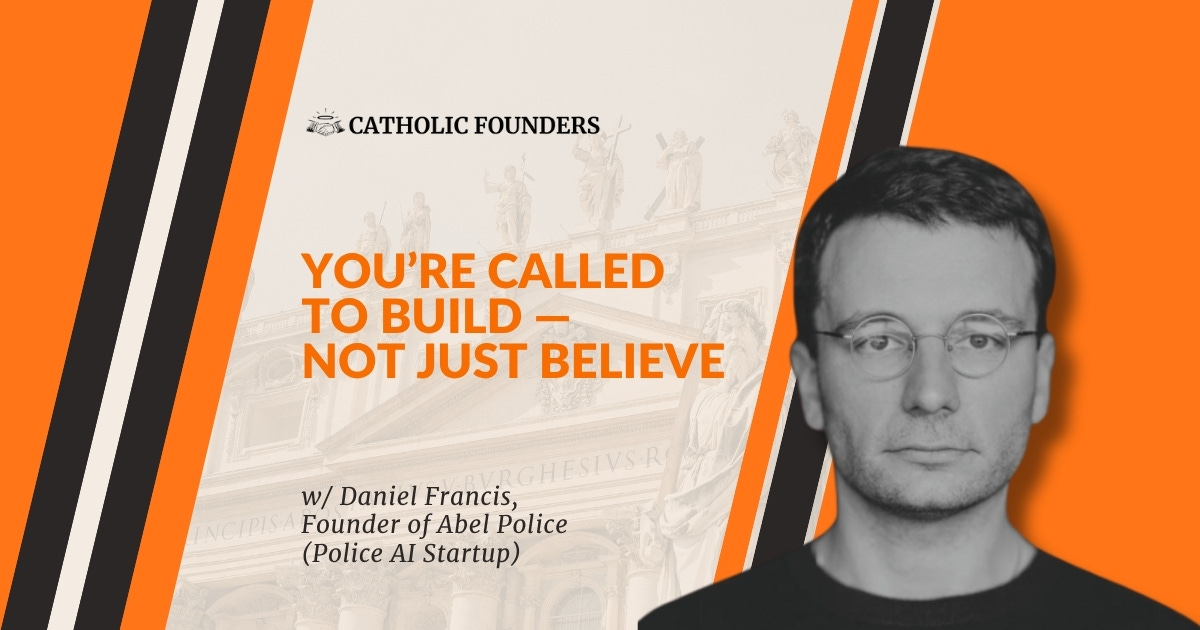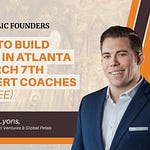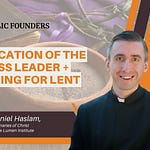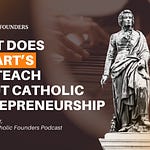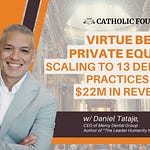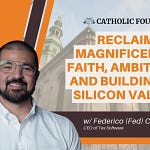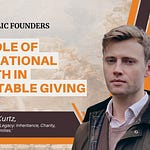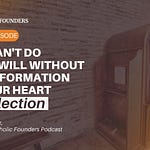Listen on: Apple Podcasts | Spotify | YouTube | Pocket Casts
Welcome back to another discussion with a cracked engineer and recent convert to the faith. I promise you’ll enjoy the hot takes and clippable moments today.
Hey everyone! Silas here 👋
We’ve reformatted the structure of the email that goes along with the pod. Have a look at let us know how you like it. Outline below.
In this Email:
Intro to the Guest and Topic
Episode References
Summary of Discussion
Key Moments
Select Quotes
Core Takeaway: As Grand as Our Visions Are, We Must First Love Our Neighbor
Full Transcript (bottom of post)
First time here? Learn more about our mission. And don’t forget to subscribe.
Today’s Topic & Guest:
Why most Catholics overlook sins of omission, “What I have failed to do” — and why building excellent things is part of our duty to God.
How the chaotic ups and downs of entrepreneurship ("the wild") can actually deepen your faith and reliance on God.
Building a shrine to Bl. Carlo Acutis in San Francisco — and why Catholic entrepreneurs should support beauty in culture.
Episode References:
People:
Paul Skallas (LindyMan) — referenced for his thinking on entrepreneurship and stability vs. payoff
Steve Jobs — Daniel’s entrepreneurial inspiration
Bl. Carlo Acutis — inspiration for programmers, shrine project
St. Peter — Daniel’s baptismal name, inspiration
St. Paul — inspiration for leadership
St. Isidore of Seville — patron saint of computer programmers
St. Teresa of Lisieux — referenced during discussion of “little way”
Media:
House of David (TV series) — mentioned as part of a Christian media effort (produced by people associated with the Federalist Society)
4-HL essay by Paul Skallas (aka LindyMan) — concept of stability space vs. payoff space (entrepreneurial risk)
The Lindy Effect — longevity of ideas/concepts as a marker of robustness (discussed via Paul Skallas)
Organizations / Groups:
Federalist Society — referenced as an example of long-term cultural/legal influence
Catholic Founders Guild — referenced during conversation about financial success and lifestyle
Star of the Sea Parish (San Francisco) — site of the Carlo Acutis shrine project
Summary of Discussion:
A lot of Catholics talk about loving humanity. Few seem interested in actually fixing their own neighborhoods. In this conversation, Daniel Francis (founder of Abel Police) talks about why restoring God’s order in your local community is where Catholic builders should start—and why so many of us overlook that calling. We also get into the sin of failing to act, why startup life drives you closer to God, and how Daniel is building a shrine to Bl. Carlo Acutis right in San Francisco. You’ll walk away challenged to think bigger.
Key Moments: (outline)
00:00 - Restoring God’s order in your community; focus on loving your neighbor
00:29 - Episode intro; who Daniel Francis is; preview of topics
02:13 - Daniel intro; what Abel Police does (AI-generated police reports)
03:14 - Origin story of Abel Police; personal experience with domestic violence case; police staffing shortages
05:35 - Entrepreneurial mindset; childhood drive to improve products; writing letters to companies
08:13 - Impact of policing tech; reducing police burnout; improving policing outcomes
09:59 - Why Catholics should build public service tech; restoring God’s order locally
11:40 - How faith and business interact; Daniel’s approach to compartmentalizing; priest advice before starting company
13:30 - Startup life bringing one closer to God; "payoff space" vs. "stability space"; "No Church in the Wild" reference
19:07 - Ambition & Catholic culture; importance of acting on talents; failure to act as a sin; call for Catholic excellence
23:40 - How deca-millionaires could influence culture; Catholic media, art, beauty; Federalist Society as model
28:53 - Rightward cultural shift; danger of a godless right wing; importance of Christian influence
31:42 - Should you bring faith to work?
Daniel’s practical approach; faith visible but not forced; Mass-work balance36:22 - Appropriate ways to bring faith to work; visible signs (rosary, medal); witnessing when opportunities arise
41:45 - Pursuing financial success; Daniel’s detachment from personal wealth; focus on building a successful company
45:00 - Shrine to Bl. Carlo Acutis; praying for intercession on technical problems; project at Star of the Sea parish
47:40 - Desire to fund Catholic art and projects long term
48:13 - Favorite Scripture for entrepreneurs: Pentecost, Peter, Paul, talents; Acts of the Apostles
50:25 - Favorite entrepreneurs: Steve Jobs; bringing beauty into products
51:45 - Favorite saints: Peter, Paul, Isidore of Seville, Teresa, Carlo Acutis
52:43 - Final words: "I hope everyone goes out and does something really well."
Seeking Sponsors
If you’d like to become a sponsor of Catholic Founders reach out today.
We offer packages that cover the entire project. As well as bespoke offerings for only the podcast or only the newsletter.
Get your offering in front of hundreds of Catholic Business owners today!
Select Quotes:
Here are some quotes to tease the conversation. (Pro-tip: if you want to help us grow, you can highlight one of these and share it)
"It’s insane to me—Catholics confess ‘what I have failed to do,’ and yet so few of us seem to take that seriously. If you have the ability to build something good and you bury it, that’s a sin." - Daniel
"I think it’s a tragedy: the right without Christianity becomes pure cruelty. A godless right wing is far more horrifying than the religious right of the ’90s." - Daniel
“I really disagree with the title of the Kanye West song, ‘No Church in the Wild,’ because I think in the wild is exactly where you find your church. Frontier people exactly knew this. This is like — you’re out here on the edge, and you’re in a foxhole basically — you must believe in God in such a situation.” - Daniel
"If Catholics can’t set the cultural vision for what we should be building, who else will? Do we really want Mark Andreessen to be the one shaping it?" - Silas
"Restoring God’s order in your community should be your top priority. People talk about loving humanity—you should start by loving your neighbor and making your city better." - Daniel
Thanks for sharing these to help us grow.
Core Lesson:
As grand as our visions are, we must first love our neighbor.
Early in this discussion, Daniel reminded us of Christ’s words that we must first love our neighbors. He said this in the context of how many Catholics express concern for humanity, but in a way that thinks about distant peoples.
In the Gospel, Jesus tells us to love our neighbor. This is intentionally. We first must love those around us and seek the good of those around us. In our communities. Not some distant group of people.
It’s not to say we can’t show concern for those elsewhere, but we must help and love those closest to us first. Our families. Our literal neighbors. Our communities. Our parish. Our fellow citizens.
You get the picture.
As you achieve success and have more resources to help others, remember to focus on those closest to you first. Not in a nepotism type of way. In a genuine concern for your neighbor type of way.
This also doesn’t always mean giving money away or donating. In many cases, it’s through building great products that serve those people. Just like what Daniel is doing with Abel Police.
God Bless & Happy Building!
~Silas Mähner
Don’t Build Alone, Join the Catholic Founders Guild
There is no perfect playbook to pursue sainthood through our entrepreneurial endeavors.
That’s why we’re building the Catholic Founders Guild. A vetted group of Catholic entrepreneurs who are building for God.
If you’re looking for Fellowship, Advice, Network, & Resources, the Catholic Founders Guild is for you.
To sign up, upgrade to paid today.
For a limited time, all paid supporters of Catholic Founders get access.
It’s $10/month or $100/year.This offer is only for a limited time, so sign up today.
Want to support our mission further? Consider becoming a member of The Magis Club, starting at $360 a year (give more if you like).
*Magis is derived from the Ignatian principle of Magis, meaning doing more for God’s glory.
Full Transcript:
Daniel Francis (00:00)
A lot of times I see concern for humanity—concern for people you've never met. But I think it's interesting that Christ told us to love our neighbor. I think you should focus on what's around you. You should try to make your own city, your own community better.
There are a lot of good things you can do in the world. But to me, this is number one: restoring God’s order in your community should be your top priority.
Silas Mähner (00:29)
Welcome back to the Catholic Founders Podcast, where we discover how to run your business like a saint.
Today, we’re speaking with Daniel Francis, the founder of Abel Police—a software company that helps police create written reports much faster, so they can get back onto the streets and keep people safe.
Daniel is a convert to the faith—he made his First Communion about a year ago—and today’s conversation covers a very wide range of topics. Some of those include why he’s frustrated by the lack of ambition among many Catholics, how we often overlook "what I have failed to do" in the Confiteor, and a project he’s leading in San Francisco to build a shrine (you’ll have to listen to hear which saint it's for!).
We also discuss whether we should "leave our faith at the door" at work—and I think we landed on a really interesting conclusion after some back and forth.
One quick note: if you know a police officer who might be interested in trying their software, definitely reach out. They’re helping police do their jobs better and avoid burnout—a noble pursuit.
And if you’re not already subscribed, be sure to check out The Saintly CEO, our free Monday newsletter with practical advice on integrating your faith into business.
Alright—enjoy the show.
Silas Mähner (02:13)
Alright—welcome to the show, Daniel. How are you doing today?
Daniel Francis (02:15)
Good, how are you doing?
Silas Mähner (02:17)
Good. I was going to ask if you’re in LA, but I remember you're in San Francisco—so you’re not witnessing everything going on down there.
For those who aren’t familiar, just give a quick intro to yourself and what you’re working on.
Daniel Francis (02:32)
I’m Daniel Francis, founder and CEO of a company called Abel Police.
We make AI tools for cops. Our primary product is called Abel Writer. It takes police body cam footage and turns it into police reports.
Turns out police spend about a third of their time writing reports—a huge waste. If you can drive that down to zero, it’s like increasing the police force by 50%, which is politically unfeasible, but technologically within reach. That’s what we’re working on.
Silas Mähner (03:03)
That’s a really fascinating problem to solve. I never really thought about this space—though my sister works locally with the police.
How did you come across this idea?
Daniel Francis (03:14)
It was through a personal experience.
A friend of mine was a victim of domestic violence. I ended up helping her get out and get an apartment.
I didn’t have much experience with this, but I learned that restraining orders are literally just pieces of paper—often given to people who can’t read.
Her husband came over one day, banging on the door, threatening to kill her. It took the Oakland police 45 minutes to get there.
I showed up and wasn’t a very satisfied consumer of police services. I kind of gave the officers some trouble about it. One of them immediately slumped and said, "I'm sorry, man. We’re super understaffed. We had a shooting this morning."
That’s when I realized that police aren’t this monolithic service that’s instantly available. Especially since 2020, it’s been really hard to hire cops. There’s a national shortage. Response times are going up. People are suffering and dying as a result.
So I started reading about policing and came across a 2021 staffing analysis for SFPD that said police spend a third of their time writing reports. And I thought, "That’s bonkers. They have body cam footage—this should be fixable."
So I’m fixing it.
Silas Mähner (05:00)
I love it. It’s a good reminder that if we let systems decay underneath us, they will. Someone has to keep improving them.
Do you think there’s something about your background that made you more solutions-oriented? Because most people would have seen that situation and just moved on.
Daniel Francis (05:35)
I guess I’ve always been like that. As a kid, I was always making little businesses. If I saw a problem, I wanted to fix it.
I also had a habit of writing letters to companies about how their products could be improved. General Mills would sometimes write back and say, "We don’t accept suggestions."
One I remember clearly—I was really annoyed that bacon packaging wasn’t resealable. I sent a letter about it and got a canned response.
Silas Mähner (06:45)
That’s hilarious. I love it. I’m going to teach my kids to do that.
Daniel Francis (06:54)
It’s satisfying. Sometimes you get real responses. I remember when Windows 7 launched, I emailed Steven Sinofsky (Microsoft’s chief architect at the time) about a taskbar suggestion.
He replied with a long email explaining that they had tested my exact idea, but people didn’t understand it, so they abandoned it.
Getting that email was so cool.
Silas Mähner (07:26)
That’s awesome. A lot of people don’t take the time to improve things.
Switching gears—have you seen your technology help improve the relationship between the police and the public?
Daniel Francis (08:13)
It’s hard to measure that directly. But we do know that giving cops more downtime is almost always better.
You don’t want police going from call to call to call. You want them in a default standby state.
A lot of policing problems happen when officers are on overtime—14 hours into a shift, burnt out. That’s when bad things happen.
So we’re trying to give them more time, make them more effective, and reduce burnout.
Silas Mähner (09:59)
From a faith perspective, it must be interesting to know you’re helping improve their experience and the public’s.
If you were trying to rally Catholics to work on public service tech or hardware, what would your pitch be?
Daniel Francis (09:59)
We live in a fallen and broken world. But it’s incumbent on us to restore God’s order here on earth.
I often see people expressing concern for humanity—but Christ told us to love our neighbor.
Start with your own city, your own community. That should be your top priority.
Silas Mähner (11:40)
That’s such a good point. I once heard a talk about justice and how we owe it to our parishes and communities—not just charity.
Switching topics—how has faith played a role in your entrepreneurial journey?
Daniel Francis (11:40)
They feel compartmentalized to me.
Before starting the company, I talked to my priest. I was considering a few ideas, and he really liked this one.
He gave me that line about restoring God’s order. So as long as our goal honors God, I focus on building the best company I can—without doing anything illegal or immoral.
Silas Mähner (13:30)
But have you found that the ups and downs of entrepreneurship have brought you closer to God?
Daniel Francis (13:39)
Absolutely.
Paul Skallas (LindyMan) has an essay about stability space vs. payoff space.
If you work as an accountant, you’re in stability space—predictable, safe. Entrepreneurs live in payoff space—high risk, big swings.
You can have a terrible meeting in the morning and amazing news by afternoon.
When you live in that space, it forces you closer to God.
I disagree with the Kanye West song No Church in the Wild—because in the wild is exactly where you find your church.
Silas Mähner (19:07)
Amen to that.
On another note—why do you think so many Catholics lack ambition? It drives me crazy sometimes.
Daniel Francis (19:07)
That really bothers me.
As a convert, one thing I loved about the Confiteor was "for what I have done and what I have failed to do."
But most Catholics only focus on what they’ve done—not what they’ve failed to do.
If I have talents and bury them, that’s a terrible sin. The parable of the talents makes that very clear.
Catholicism should be associated with excellence. We should be building great things.
Silas Mähner (23:40)
If you had $20 million to invest in influencing the culture—what would you do?
Daniel Francis (23:40)
I don’t know exactly—it’s not an easy problem.
I admire what some are doing, like the production company behind David (the TV show). They’re trying to make the culture more Christian through media.
You have to be careful—bad ideas can look good on the surface. Like the Gates Foundation realized with building wells that broke down in a year.
But I think building high-quality Christian media is one huge opportunity.
Also—beauty matters. The Church needs to invest in art, in restoring our physical spaces. I’d love to support that.
Silas Mähner (28:53)
I worry that the cultural swing to the right won’t be led by Christians—it could get dangerous.
Thoughts?
Daniel Francis (28:53)
I think that’s already happening.
A godless right wing is much more horrifying than the religious right of the ’90s.
I see genuine expressions of cruelty sometimes—toward trans people, immigrants, others.
I hope Christians assert themselves in this space—and not just by aligning with Trump or political figures. God has to stay first.
Silas Mähner (31:42)
Let’s talk about faith at work.
Do you bring your faith into your company?
Daniel Francis (31:42)
I know some founders open meetings with prayer—that’s not my style.
When you’re driving a car, focus on driving. When I’m building this company, I focus on building it well.
We need to run a very profitable, very powerful company that impacts U.S. policing.
I go to Mass every morning—that grounds me. I keep a rosary on my desk. My employees know I’m Catholic, but I don’t preach at work.
If someone asks, I’ll share. But otherwise—I focus on the mission.
Silas Mähner (36:22)
I’m coming around to that view.
At the very least, I think it’s important that we don’t hide our faith—so if someone sees a crucifix or a rosary, it can spark a conversation.
Daniel Francis (36:22)
I absolutely agree.
I often have my Miraculous Medal out. I used to wear a rosary around my neck.
It’s important to take up space with your faith—not in a confrontational way, but as a sign of who you are.
We live in San Francisco. People wear their beliefs on their bodies all the time. Catholics can do the same.
Silas Mähner (41:45)
How do you think about financial success as a Catholic founder?
Daniel Francis (41:45)
Honestly, I’ve never been that concerned with money.
I fell in love with math, got a math degree, and ended up in well-paying jobs early on.
My goal was always simple: I want to go to restaurants and not worry about the bill.
Now, my main concern is honoring my investors. They gave me capital when I was just a guy coding in his living room.
I want to make this company massively successful for them.
If I make money personally—great. I’d love to support Catholic projects, especially in art and church restoration.
Silas Mähner (45:00)
Tell us about the shrine project you’re working on.
Daniel Francis (45:00)
We’re building a shrine to Bl. Carlo Acutis at Star of the Sea Parish here in San Francisco.
I started praying to Carlo for help with technical challenges—especially during our migration to Kubernetes.
Every week now, I pray for his intercession on engineering problems.
We’re creating a space where other programmers can come pray too. There will be a plaque with a prayer for technical challenges.
The Church needs to reach out to the community in ways that resonate. Tech is a huge part of this city—this is one way to meet people where they are.
Silas Mähner (47:40)
That’s amazing.
Even if we’re not deca-millionaires, I think we can all find ways to have an impact on our communities.
Daniel Francis (47:40)
Absolutely.
Small things done well matter. Beauty matters.
I’d love to spend my life supporting unique Catholic projects that show the beauty of the faith to the world.
Silas Mähner (48:13)
What scriptures or readings inspire you as an entrepreneur?
Daniel Francis (48:13)
The story of Pentecost.
My baptismal name is Peter—I love Peter. He was a bit of a moron, then the Holy Spirit transformed him.
The parable of the talents is huge for me. If you have talents and bury them—that’s a sin.
And I love Acts of the Apostles. The energy of the early Church was insane. It’s inspiring.
Silas Mähner (49:05)
Any entrepreneurs who inspire you?
Daniel Francis (49:10)
Steve Jobs.
He was a deeply flawed person, but he brought beauty into the world through products.
I think beauty points people toward the divine. In my industry, most software is ugly.
I want to bring light into that space.
Silas Mähner (50:25)
What about saints?
Daniel Francis (50:25)
As a convert, I’m still learning about the saints.
But Peter and Paul are huge for me.
I’ve also read a lot about St. Isidore of Seville—he’s the patron of computer programmers.
And of course, Bl. Carlo Acutis. He’s been a big part of my journey.
Acts of the Apostles is my favorite book—such an entrepreneurial spirit in those early days.
Silas Mähner (52:37)
I totally agree. The early Church was on fire—they knew they’d likely be killed for this, and they did it anyway.
It’s incredibly inspiring.
Daniel Francis (52:43)
I hope everyone listening goes out and does something really well.
Silas Mähner (52:50)
Amen to that.
Thank you so much for coming on, Daniel—this was a great conversation.
Daniel Francis (52:53)
Thanks—great to be here.
Silas Mähner (52:54)
Alright, everyone—thank you so much for tuning in.
If you enjoyed this episode, leave us a five-star review on your favorite podcast player.
And if you haven’t already—subscribe to us on YouTube. Once we hit 1,000 subscribers, we can monetize and help fund this work.
And don’t forget—subscribe to The Saintly CEO, our free Monday newsletter on integrating your faith into business.
And if you want to be part of a peer group of Catholic entrepreneurs, consider becoming a paid member. Just head to catholicfounders.com/subscribe.
Alright—that’s it. God bless, and we’ll see you next time on Catholic Founders.



